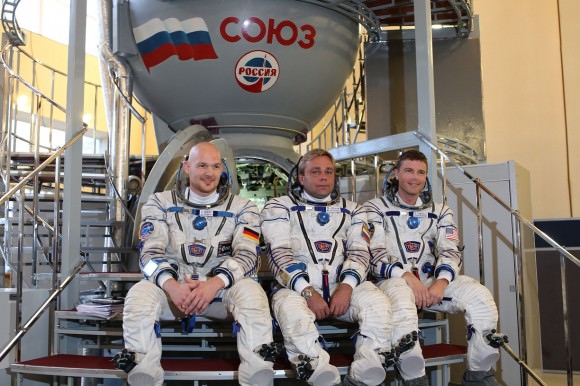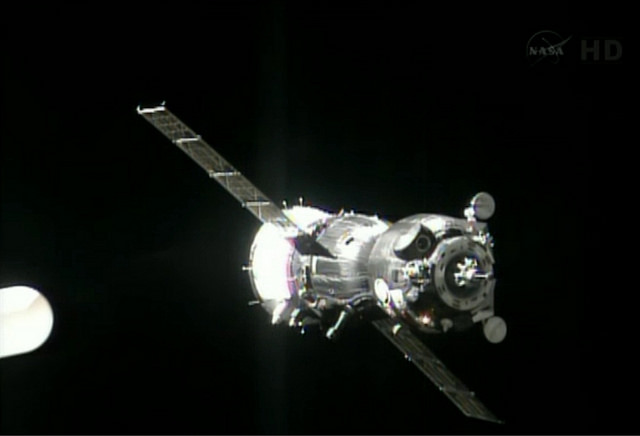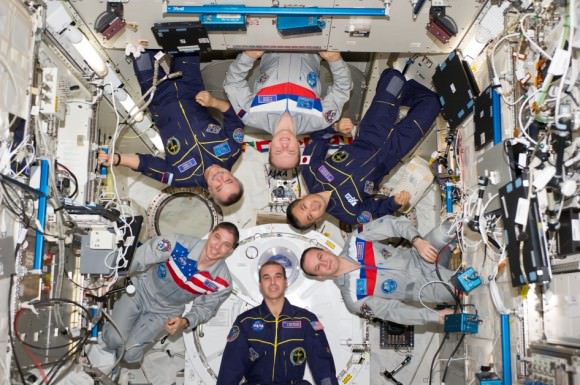NASA plans to cease most work with the Russian Federal Space Agency amid growing tensions concerning the Ukrainian crisis, a spokesperson confirmed with a statement to Universe Today Wednesday evening (April 2).
While the International Space Station will still see work to “maintain safe and continuous operation”, most other NASA activities with Roscosmos will cease, the statement read. It added (citing the Obama administration) that Congress now faces a choice between fully funding human U.S. launches again in 2017, or facing years more of sending money to the Russians for Soyuz launches from Kazakhstan.
In full, this is the statement that Bob Jacobs, NASA’s deputy associate administrator of communications, sent to Universe Today (UPDATE, 8:54 p.m. EDT — this is also now available on NASA’s G+ page)
Given Russia’s ongoing violation of Ukraine’s sovereignty and territorial integrity, NASA is suspending the majority of its ongoing engagements with the Russian Federation. NASA and Roscosmos will, however, continue to work together to maintain safe and continuous operation of the International Space Station.
NASA is laser focused on a plan to return human spaceflight launches to American soil, and end our reliance on Russia to get into space. This has been a top priority of the Obama Administration’s for the past five years, and had our plan been fully funded, we would have returned American human spaceflight launches – and the jobs they support – back to the United States next year.
With the reduced level of funding approved by Congress, we’re now looking at launching from U.S. soil in 2017. The choice here is between fully funding the plan to bring space launches back to America or continuing to send millions of dollars to the Russians. It’s that simple. The Obama Administration chooses to invest in America – and we are hopeful that Congress will do the same.
It is unclear from this statement exactly what activities would constitute “safe and continuous operation” of station. So, for example, it’s unclear so far if (for example) NASA will still send photographers to cover launches and landing in Russia, or to what extent NASA TV broadcasts of Russian spacewalks would be affected.
Since the shuttle retired in 2011, NASA and other space agencies such as the European Space Agency have relied on Russian Soyuz spacecraft to bring astronauts to the International Space Station. Crews are generally made up of large proportions of Russian cosmonauts and American astronauts, as well as a few astronauts from other agencies. The current Expedition 39 crew has has three Russians, two Americans and a Japanese commander, Koichi Wakata. Expedition 40 will launch aboard a Soyuz spacecraft in May, if all goes to plan.

The human spaceflight relationship between NASA and Russia stretches back to the 1970s when Russia was then the Soviet Union. Their first joint mission was with the Apollo-Soyuz Test Project in 1975. That relationship expanded when several NASA shuttles visited the Russian space station Mir in the 1990s, laying the groundwork for the International Space Station agreement today.
NASA is working on a commercial crew program that right now is slated to bring U.S. astronauts into space from American soil again in 2017. There are several proposals being considered: a human-rated version of SpaceX’s Dragon, Blue Origin’s New Shepard, Sierra Nevada Corp.’s Dream Chaser and the Boeing Co.’s CST-100. NASA releases regular updates on how these companies — most of which receive money from the agency for development — are progressing, with the most recent update coming March 31.
It is unclear, however, how much money CCP will receive in the upcoming fiscal 2015 budget request before Congress. Historically, NASA receives less money for this program than what the agency requests (which has pushed back launches by a few years). The new tensions with Russia, however, could make things different this time around. This seems to be what NASA is counting on in the statement.
As far as what missions could be affected due to cooperation with Russia, planetary scientist Barbara Cohen said on Twitter that while it may appear the US may do little with Russia beyond the International Space Station, cooperation in planetary science is rather big. Russian scientists contribute to several ongoing and upcoming NASA robotic missions, and US scientists are contributing to the planning for ExoMars, which is an ESA-Roscosmos mission, and the US is contributing Elektra telecommunication radios to the orbiter and part of a mass spectrometer for the rover. Additionally, US scientists are working with the Verera-D mission, a strategic Venus mission sponsored by Roscosmos, with participation by NASA’s Planetary Science Division.
The news of the breach comes about a month after NASA administrator Charlie Bolden told reporters that the Russian diplomacy crisis, which erupted after troops went to Crimea a few weeks ago (to U.S. and other countries’ condemnation), would not affect Soyuz launches or other activities related to the space station.

“Everything is nominal right now in our relationship with the Russians. We continue to monitor the situation,” said NASA administrator Charles Bolden in a conference call with reporters March 4, following the release of NASA’s preliminary budget request.
“The safety of our crews and our assets that has not changed. Safety is the No. 1 of NASA’s core values, so we are constantly doing contingency planning on the International Space Station for emergencies that might arise,” Bolden added, citing an emergency ammonia pump replacement in December as one such example.
“Those are the kinds of things we are always planning for, and in terms of the situation on the ground, we will go into contingency planning for that as the situation dictates. But right now, we don’t see any reason to do so,” he added.
International Space Station operations were recently extended to at least 2024, and NASA officials have pointed out that it and similar agreements have weathered other world crises.
Wednesday’s news first came to light in a reported internal memo posted on SpaceRef’s website that morning. Jacobs did not confirm or deny the memo’s authenticity in the e-mail to Universe Today.
Universe Today will issue updates as circumstances warrant.


How much cooperation is there between NASA and the Russians other than the ISS and everything in connection with it?
This is just stupid. No other word for it.
It’s only a matter of time before Russia pulls the trigger and refuses to send Americans to the ISS. Unfortunately, the astronauts and cosmonauts are going to be pawns in this game. NASA would do well to pour all its money into Space X, the only company that is close to having a man-rated capsule to service the station, even at the cost of further development of the Orion program.
Rule of Acquisition #177: Know your enemies… but do business with them always. 😉
As tensions continue to rise
Cooperative spirit soon dies
But how will it end
As foe or a friend
And how will we stay in the skies?
Ooh, ooh, Russia is gonna throw all the Americans out the airlock, and there is nothing we can do, aaah aaah!
Get real, folks. The US and Russia were cooperating in the 1970’s. I remember the 1970’s well. The US and Russia weren’t exactly BFFS then, right? But they could still get on with going to space and back. Maybe all is not well in the Crimea, but the space stuff carries on. And that’s just as it should be.
We can thank the administration’s State Department (John Kerry) for forcing this stupidity on NASA.
Geesh… just when you think it’s safe to go back in the water, shark fins appear. Am hoping something good will come out of all this? Namely, that congress will get off it’s butt ASAP and fully fund even expedite the development of manned space flight from US soils.
Funny, NASA by outsourcing the manned launches to Russia not only did they put their very NASA engineers out of job, lose the necessary experience of how to build and fly manned space crafts. They also sent money to Putin that can be used to invade other countries.
I am going to say it anyway. I told you so!
Now reinstate the NASA budget and restart the space race.
The space race that put humans on the Moon, now go back and build that moon base before the Chinese and Russians do.